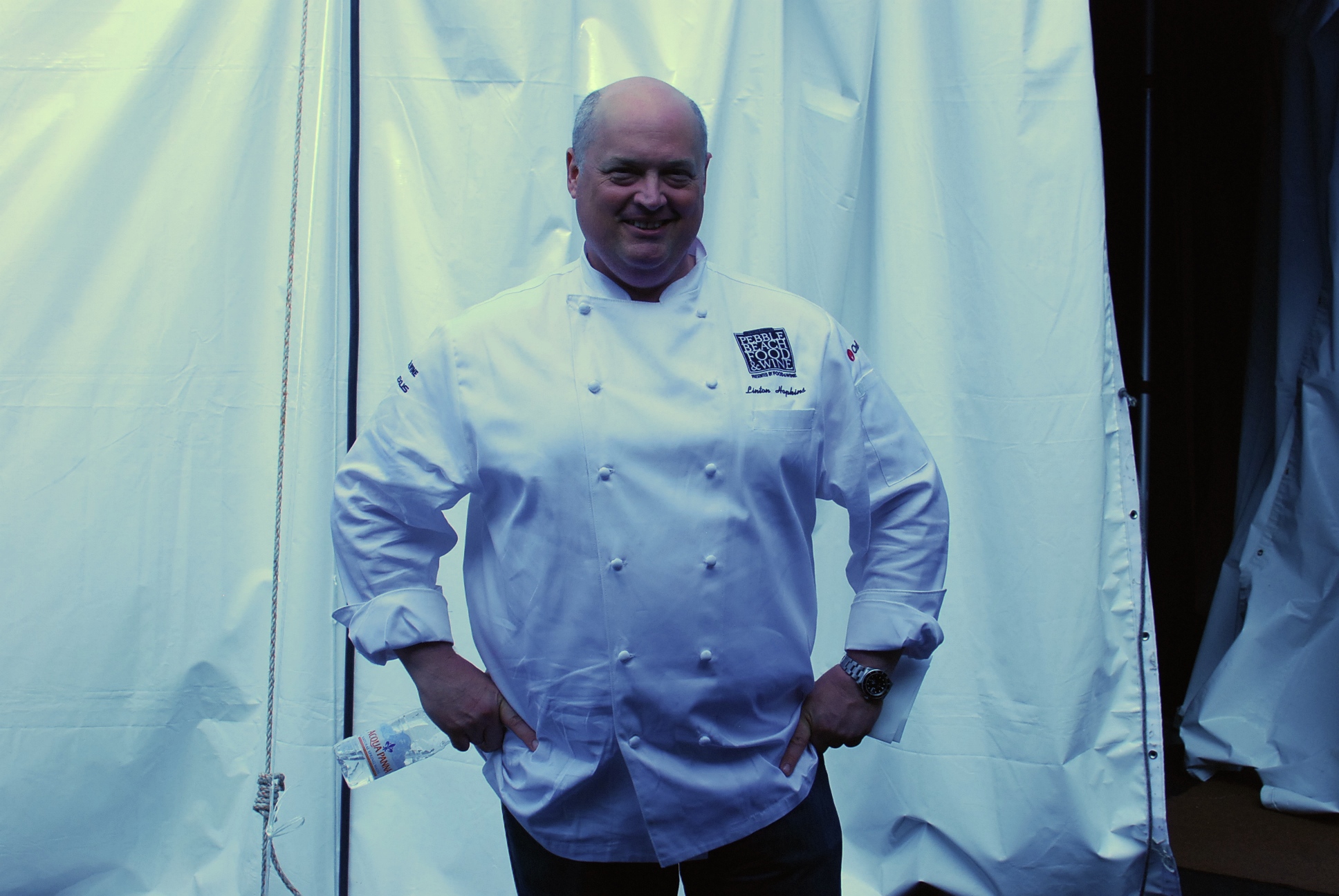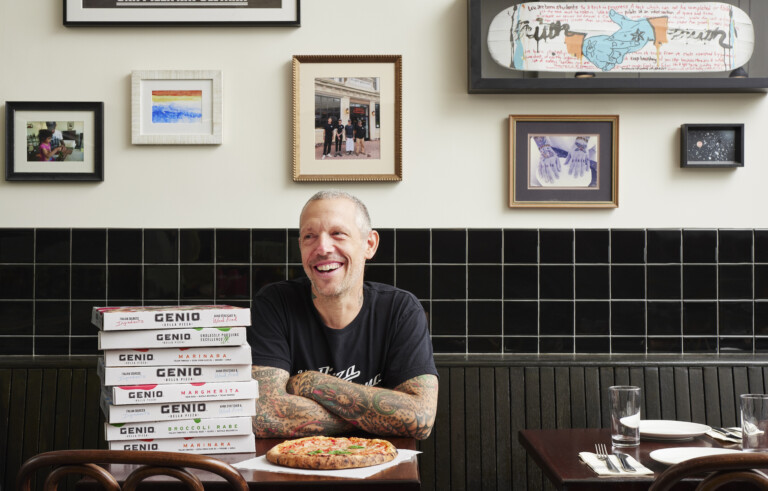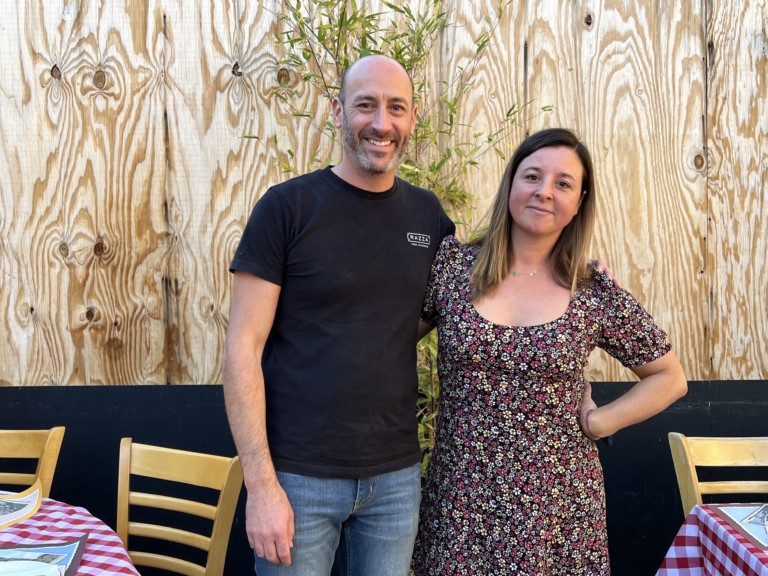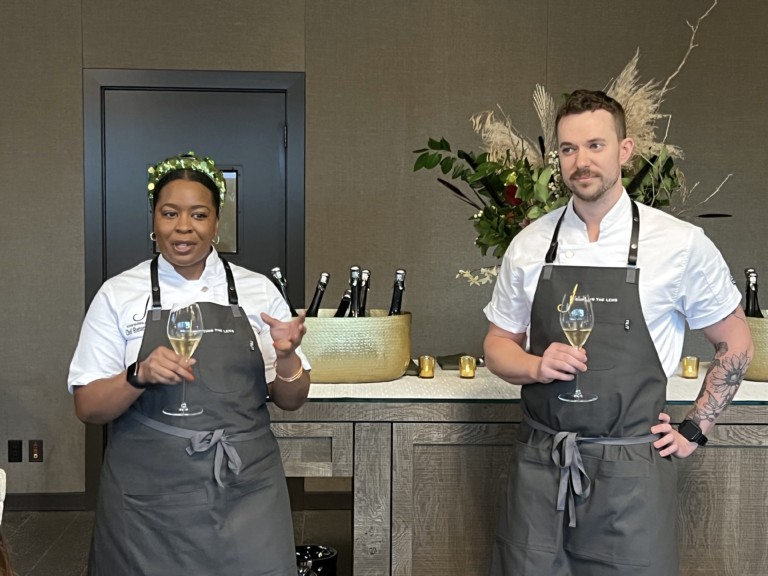Chef Linton Hopkins has deep roots in Atlanta. He’s an eighth generation Georgian and attended Emory University and the Culinary Institute of America before launching restaurants near where he grew up. He’s now the chef-owner of Restaurant Eugene, Holeman & Finch and H&F Bread Co.with wife Gina, which all honor grandfather Eugene Holeman. Yes, Hopkins is best known for the H&F Burger, which now sells by the thousands at Atlanta Braves games, but he’s really focused on seasonal, nose to tail Southern cooking. At the 2014 Pebble Beach Food & Wine festival, Chef Hopkins shared several insights.
Josh Lurie: Was it a given that you would become a chef, or did you consider other careers?
Linton Hopkins: No, I was pre-med, I was a biological anthropology major. I grew up in a doctor’s house. My father’s a physician, and I thought I was going on to medical school. But I cooked my whole life, I grew up in a family that always ate at home, never ate out at restaurants. My job in high school was at a small little catering place as a dishwasher, then as a retail person, and then making shrimp salad and things. I worked in a pizza joint when I was at Emory.
JL: What was the town you were from in Georgia?
LH: From Atlanta. And yeah, my restaurants are not more than half a mile from where I grew up. I remember I saw a book, it’s called The Guide to Culinary School. I was working at the largest independent book seller in Atlanta called Oxford. In this red book, it started talking about the history of the culinary craft and the top schools. You know, when you’re in your young twenties sort of figuring out what you want to do the rest of your life, I can’t believe it just dawned on me then that I could actually spend the rest of my life cooking as a career, how amazing that is. So I told my parents, I’m not going to medical school, I’m actually going to apply to the Culinary School of America. Within 5 weeks of reading that book I was up in New York.
JL: How did they take that decision?
LH: My father loved it. He loves passion about things. With my father, I learned you don’t punch in and out on who you are, that what you do should be an expression of who you are. I’m a cook, I always have been, I’ve always cooked from scratch for myself. Getting home from school I would make chicken Kiev and omelets from when I was 10 years old. And the idea, my grandfather Eugene Holeman, who I named the restaurant after, grew up on a farm and was part of the Food and Drug Administration from the state of Tennessee. He had a garden and we ate fresh tomatoes and cured country ham and we made caramel cake for his birthday. This was how we lived. To be able to do that, on a professional side, as my job, just was an amazing blessing. Professional cooking can take a lot of your love of food out of you, because it’s about the business of food and it can be the discipline of food. But I needed that too in my younger twenties, you know. I loved the discipline of the professional kitchen and what that meant, that cadre of being great at something. So once I was in the first class at CIA, which was called Intro to Gastronomy, we weren’t even in the kitchen. We sat around and watched movies and read books and had discussions about the culinary arts, and I was hooked because I had to have a career that was not only physically real and felt honest, because of my hands, but was intellectually stimulating. And cuisine and food and the culture, I feel like I use my anthropology degree now more than I ever did in college. Its like a real anthropology.
JL: What does a dish have to be to serve it at Restaurant Eugene and how does that differ from what you would put on the menu at Holeman & Finch?
LH: Well, that’s a good question. I think about this a lot. I cook in three primary places, home, first, because I cook dinner for my family pretty much every night. Restaurant Eugene, which is our fine dining restaurant, and Holeman & Finch. Now, the way I think about food, it’s the same ingredients, so how can one be different? Well, a lot has to do with the labor involved and the complexity of the dish. The quality of the ingredients are all the same, but take a whole animal like a pig or a veal I break down at Holeman & Finch, now the parts for braising will go onto the menu at Holeman & Finch, the loins and what are considered the more high-valued pieces go over to Restaurant Eugene. Then at home I’m roasting chicken. So yeah, it’s all about intent, you know. If I want it to be a haute cuisine dish, I’m going to cut it a certain way, plate it a certain way, use different parts of the animals, truffles when they’re in season. But Holeman & Finch is the idea of really small little snacks around eating and drinking, community building, small tastes. Eugene is a la carte and tasting menus at the same time. And more of a celebration of vegetables and fish at Eugene. Holeman & Finch is more about pigs and animals, you know, ground animals, birds and parts. There’s a section just called Parts. Testicles and brains and everything, marrow. Because you think about it from a cook’s standpoint, is there really a difference, between one part and another part of an animal. Once you’re an omnivore, then go all the way. I mean, they’re all the same.
JL: You talk about intent, so just in terms of intentions and what you intend to accomplish with your restaurants, and what your goals are for the restaurants, how would you describe that? What is it that you’re hoping to accomplish?
LH: The intent for me is being a part of building the community of food, in a very meaningful way. Not as a sidebar to the community, but actually building the community themselves. When I travel, I like to look for those places that are such a part of their community, you couldn’t imagine that community without them. So when we built Restaurant Eugene and were thinking about Holeman & Finch, I like to think about what will it take to be a multi-generational restaurant. It’s gotta be more than just building a great cocktail party for 5 years and getting return on my money. I grew up on the same streets my restaurants are on, which are the same streets my grandfather grew up on, the same streets my great grandfather grew up on. My son is ninth generation Georgian, so it means a lot to me to be a part of that community. I feel a responsibility as an adult to add to that community, and I know that restaurants—you know, we built a farmer’s market, and we built a bakery that supplies bread now to over 250 restaurants in the Atlanta area, just fresh bread delivered every day—there’s no end to the community building around food. Again, food creates community and relationships. It’s more than being about a chef, even though that’s very current right now. It’s bigger than that.
JL: How many kids do you have?
LH: 2 kids. I have Linton, who’s 14, and Avery, who’s 12.
JL: What are the chances that your children follow you into the restaurant world?









Leave a Comment